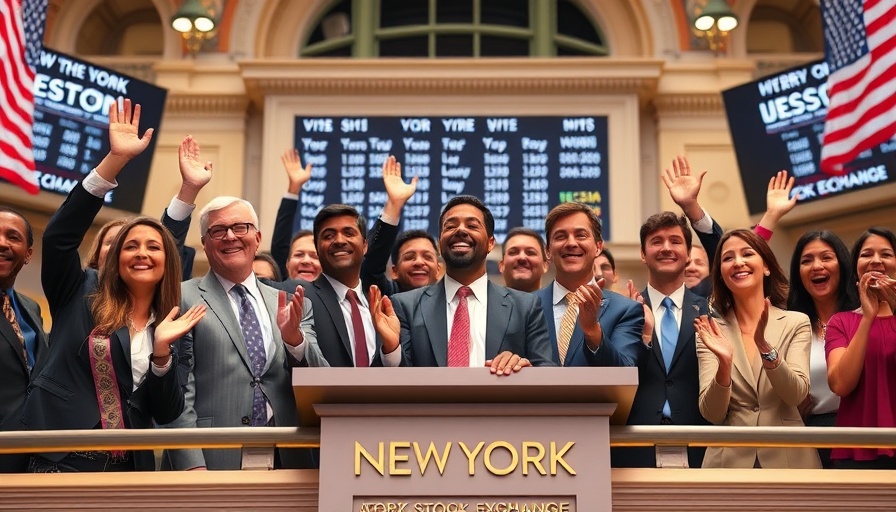
Cultivating a Healthier Workplace: The Urgent Need for Mental Health Focus
In a compelling discussion held at the New York Stock Exchange that featured Joan Woodward, the president of the Travelers Institute, essential insights were shared regarding the intersection of mental health and technology in today’s workforce. Dr. Jerome Adams, former U.S. Surgeon General, highlighted alarming statistics showing that anxiety disorders affect nearly 40 million adults in the U.S., with depression impacting one in six Americans. These mental health challenges, according to Dr. Adams, lead to a staggering $200 billion loss in earnings annually, indicating a clear need for organizations to prioritize mental wellness.
Employers play a significant role in addressing mental health, and Dr. Adams emphasized the importance of supporting their employees through measures such as advocating for work-life balance and offering comprehensive employee assistance programs. He stated emphatically, "Prioritizing mental health creates a healthier and more productive workforce." This recognition of mental health as integral to overall employee well-being sets the stage for a transformative shift in workplace culture.
Understanding the Whole Employee: A Holistic Approach
The conversation around creating an effective mental health action plan was further developed by Rich Ives from Travelers. Ives asserted that taking care of the whole person—not just their work metrics—is crucial. He pointed out the financial ramifications of neglecting mental and physical health, noting that workplace claims can see costs double when comorbid conditions are involved. "Mental well-being is just as important as physical well-being," he echoed the sentiment that companies must address all facets of employee health.
This holistic approach isn’t just about reducing healthcare costs; it’s about nurturing a workforce where employees can thrive and contribute more effectively. Encouraging a culture of openness around mental health can also combat stigma, leading to increased satisfaction and retention rates.
Tech Talent: Competing for the Future of Work
As workplaces adapt to changes driven by technology, the talent landscape becomes increasingly competitive. Mojgan Lefebvre, Chief Technology Officer at Travelers, highlighted the need for organizations to focus on employee experience and proactively build talent pipelines to align with technological advancements. She underscored the critical role of education and training in preparing employees for the future job market. "We are a data company at the core and are making decisions around risk,” she remarked, underscoring the need for workers who can navigate the evolving demands of tech-driven environments.
In light of competition from tech giants like Amazon and Google, Travelers has taken strategic steps to position itself as a leader in tech talent acquisition. Establishing a technology hub near Georgia Tech is one such initiative aimed at harnessing fresh talent. Lefebvre noted that successfully attracting and retaining talent involves providing the right tools and opportunities, reiterating the connection between organizational investment in technology and employee morale.
Innovative Approaches to Workforce Retention
The measures being discussed are not just theoretical; they represent a necessary shift in organizational strategy. Employers must now reckon with the evolving role of their workforce's mental health and the skills necessary for a more tech-focused future. Insights from industry leaders suggest that it’s time to rethink traditional management approaches to embrace innovation in both health and talent management.
As we continue to navigate the increasingly complex dynamics of the modern workplace, initiatives promoting wellness and enhancing skills will prove invaluable. According to experts, prioritizing mental health could ultimately enhance productivity, reduce turnover costs, and foster a resilient workplace culture.
Your Role in Shaping Healthy Work Environments
As a part of the workforce, consider what your role is in advocating for a supportive and mentally healthy work environment. Are you engaging in conversations about mental health at work? Are you seeking out resources that address stress and burnout? By contributing to conversations around mental health, you can help create an environment that supports everyone.
In summary, as the dialogue around mental health and technology in the workplace expands, so do the opportunities for employees to engage proactively in finding solutions that benefit both themselves and their organizations. Prioritize mental health, invest in skills, and watch as your workplace transforms into a more productive and enriching environment.
 Add Row
Add Row  Add
Add 




 Add Row
Add Row  Add
Add 

Write A Comment